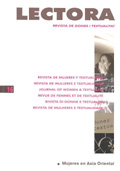Chiasmatic Narrative and Twisted Subjectivity in Kanai Mieko's Boshizô
Paraules clau:
Japanese literature, psychoanalysis, Kanai Mieko, Boshizô, female subjectivity, Oedipus complex, female desire, incestResum
The article provides a reading, from a psychoanalytic point of view, of Japanese writer Kanai Mieko’s short tale Boshizô (Portrait of Mother and Child), published in 1992, as a “twisted” or “contorted” parable of the construction of female subjectivity. Establishing connections between the form and the content of the novel, the essay analyzes how Kanai’s use of the rhetorical figure of the chiasmus structures the internal narrative of the novel at the same time that it reflects the process of formation of female subjectivity and desire. The novel becomes, thus, a staging of the female Oedipus complex which plays out its twists.Descàrregues
Publicades
Com citar
Número
Secció
Llicència
Els autors i les autores conserven els drets d’autoria i atorguen a Lectora: revista de dones i textualitat el dret de difusió. L'’obra serà disponible simultàniament sota una Llicència de Reconeixement-NoComercial- SenseObraDerivada de Creative Commons que, si no si indica el contari, permet compartir l’obra amb tercers, sempre que aquests en reconeguin l’autoria i la publicació inicial en aquesta revista.
Els autors i autores són lliures de fer acords contractuals addicionals independents per a la distribució no exclusiva de la versió de l’obra publicada a la revista (com ara la publicació en un repositori institucional o en un llibre), sempre que se’n reconegui la publicació inicial en aquesta revista.
S’encoratja els autors i autores a reproduir la seva obra en línia (en repositoris institucionals, temàtics o a la seva pàgina web, per exemple), amb l’objectiu d’aconseguir intercanvis productius i fer que l’obra obtingui més citacions (vegeu The Effect of Open Access, en anglès).




